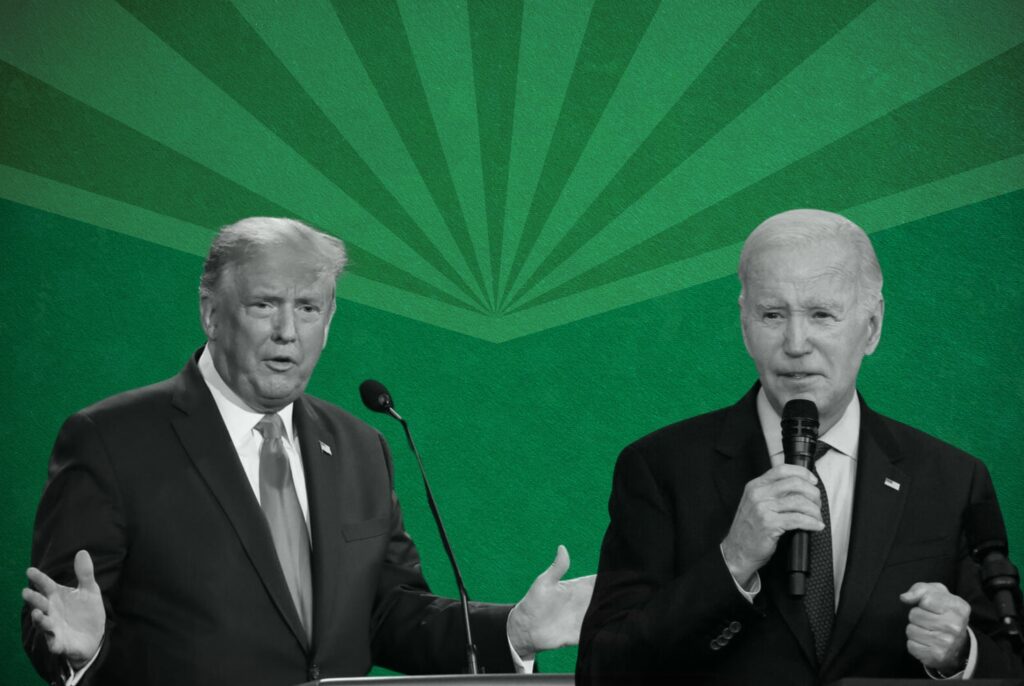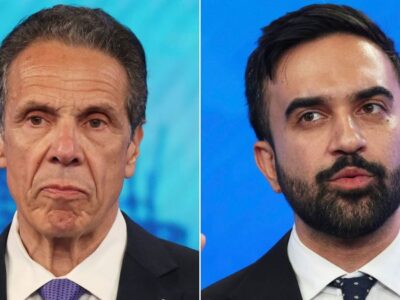Will Biden and Trump Debate Climate Change?
Here are 22 climate-related questions that moderators could ask Biden and Trump in the presidential debates, as well as the one question they should avoid.

President Joe Biden and former president Donald Trump are tentatively set to square off on a stage in Atlanta on June 27 in the first of two presidential debates and there are plenty of climate-related questions that CNN moderators should consider—especially since parts of the country may be sweltering under a heat wave, Georgia’s neighbors will be preparing for an abnormally intense hurricane season, and Earth just recorded its 12th consecutive month of record-breaking heat.
But let’s begin with the one question CNN’s Jake Tapper and Dana Bash should flat-out avoid. FFS do not ask Trump and Biden any version of the question, “Do you believe in climate change?”
Confront political candidates on what they will do, not what they believe, particularly when it comes to climate change. Last summer, Fox News moderators surprised everyone when climate change got about 4 minutes at the GOP presidential primary debate, but surprising no one, the answers were moronic. Yes, it was a welcome change from past debates—but they asked lamely for a “show of hands by those who believed in human-caused climate change.” Not only does that confuse climate science with religion, but it throws open the door to mad rants. Which is exactly what happened. And Trump wasn’t even on stage.
The goal of the moderators: force these two candidates to defend their starkly different records and visions. What have each of them actually done as president to improve the environment in ways that make people healthier and safer—or more at risk and more miserable? The other goal: try to keep them from lying about one another’s record—easier said than done, but hey that’s the job. With my colleagues at the UCLA Emmett Institute, I have looked into the climate agenda of a possible second Trump term (here, here, and here) as well as the major climate initiatives of Biden’s first term (here) so we’re happy to suggest some questions below.
Now, it’s possible that climate change won’t even make the cut. Biden wants to focus on abortion rights, the state of democracy, and the economy, according to a campaign memo viewed by Reuters, while Trump’s campaign has talked about immigration, public safety and inflation. I think it’d be unfortunate for voters if they weren’t pressed on climate change, but not everyone agrees. Some say that Biden and Democrats have already lost the climate debate to Trump and the GOP because Republicans have successfully branded themselves as “anti-anti-climate change” rather than “anti-environment.” Point taken. But a debate stage remains one of the only media moments where that fantasy can be pierced.
A debate is a rare opportunity to show some voters (possibly for the first time) what Biden has (and has not) done to address climate change and what he promises to do in another four years. In theory it’s a rare opportunity to confront Trump with his disastrous 2017-2020 record as well as his apocalyptic 2025 gameplan. It’s also a chance to publicly press him on what he’s privately promised oil executives he’ll do in a second term.
Before asking any climate question, moderators should say simply, “We’re not going to waste time disputing scientific facts, so we’ll turn off your mic if you use your time to lie about climate science.” If that means a one-sided debate, so be it. Wouldn’t you love to hear them answer even just a few of these questions?
22 questions moderators are welcome to steal:
Both candidates: Name three things you did as president to make our air, water, and climate system safer for American families?
Both: The bipartisan Infrastructure Bill and the Inflation Reduction Act have spurred hundreds of billions of dollars in investments and hundreds of thousands of jobs in climate-friendly technologies. What would you do to build upon, change, or weaken these laws?
Trump: Repeal is a catchy slogan, but it’s logistically complicated and not politically viable. You failed to repeal Obamacare for the same reasons. Even Big Oil, the Chamber of Commerce, and some GOP lawmakers say they’d fight to keep parts of the IRA. Explain why these Republicans and business groups are wrong.
Biden: Despite these landmark climate laws, the Sunrise Movement—the influential national environmental organization—is for now withholding its endorsement, citing your administration’s handling of Gaza and oil drilling approvals. What is your response to youth activists who could stay on the sidelines in this election?
Both: Gaza is a climate issue as well as a humanitarian issue: Research shows the climate cost of destroying and then rebuilding Gaza is massive. What responsibility does Israel—and the US—have in addressing the environmental catastrophe?
Trump: Project 2025 is a 920-page game plan for a second Trump term that outlines a radical shift in federal policies written by folks who’ve worked for you. It’s been out for many months. Is it fair to say that you approve of this plan?
Trump: What did you accomplish by withdrawing from the Paris Agreement, which sets international climate targets but is largely non-binding? And would you withdraw again even if it meant negative implications for US security, economic policy, and trade policy?
Biden: During your time in office America has become the world’s #1 exporter of natural gas. What will your approach be to oil and gas drilling in a second term?
Trump: A majority of voters (53%) report being less likely to vote for a candidate who accepts donations from oil and gas companies or CEOs. Even more voters (62%) say they don’t trust the industry to speak truthfully about fossil fuels. Multiple media outlets report that you have courted oil executives for big donations in exchange for repealing regulations they don’t like, a sort of quid pro quo. Would you like to, here and now, repeat what you said privately or to decline oil and gas contributions?
Both: Turning to our record heat, the death certificates of more than 2,300 people who died last summer in the U.S. mention the effects of excessive heat — a record according to an Associated Press analysis of CDC data. What would you do to make Americans safe in the workplace and in their homes in the face of record heat?
Both: Here in Atlanta, 94 percent of buildings have air conditioning, so researchers at Georgia Tech looked at the consequences of a major blackout during a heat wave here and in two other cities. Their models found there would be 12,540 visits to emergency rooms in Atlanta. In Phoenix, 13,000 people could die. What will you do to prevent a mass casualty event from extreme heat?
Both: As temperatures rise, the electricity grid is also vulnerable. What will you do to accelerate transmission modernization and make the grid more resilient?
Both: Should there be an Operation Warp Speed but for renewable energy?
Both: Name some emerging energy technologies where you would direct investment from the U.S. government so that America can reap the rewards if that tech becomes widespread.
Both: Who are the key people—and what are their qualifications—who will staff the agencies involved in energy and the environment in your administration?
Both: There is no disputing that a global energy transition is underway—the IAE says 50% of global electricity will come from renewables by 2030—what will you do to help low-income Americans participate in this shift and not be left behind or hurt economically?
Both: There is also no disputing that the American auto industry is transitioning away from dirty fossil fuels to cleaner electric cars. EV sales are nearing 10% of the market, much more in other countries. Certain policies can accelerate or slow that process. How would you steer these policies in a second term?
Trump: Car manufacturers know that whiplash is bad for business. Ford Motor Co. has even filed briefs on the side of the EPA in a lawsuit by Republican AGs over auto standards. Why would you pick a fight with American automakers who say they don’t want to see policy reversals?
Both: One of the only climate-related policies on which you two agree may be sky high tariffs on electric vehicles manufactured by China. Knowing that we must rapidly increase the number of EVs on the road, why shouldn’t Americans be able to buy a new Chinese EV for $20,000 or so if it’s made in North America?
Biden: EVs alone will not reduce emissions enough or address other environmental justice issues. Do you think more cities should consider congestion pricing policies like the one that New York’s Democratic governor just killed?
Both: China and the U.S. are the world’s largest greenhouse gas emitters. How would you balance cooperation and competition with China in a second term?
Both: Describe a wilderness spot anywhere in America, whether a hiking trail or a National Park, that you love and why.






Reader Comments